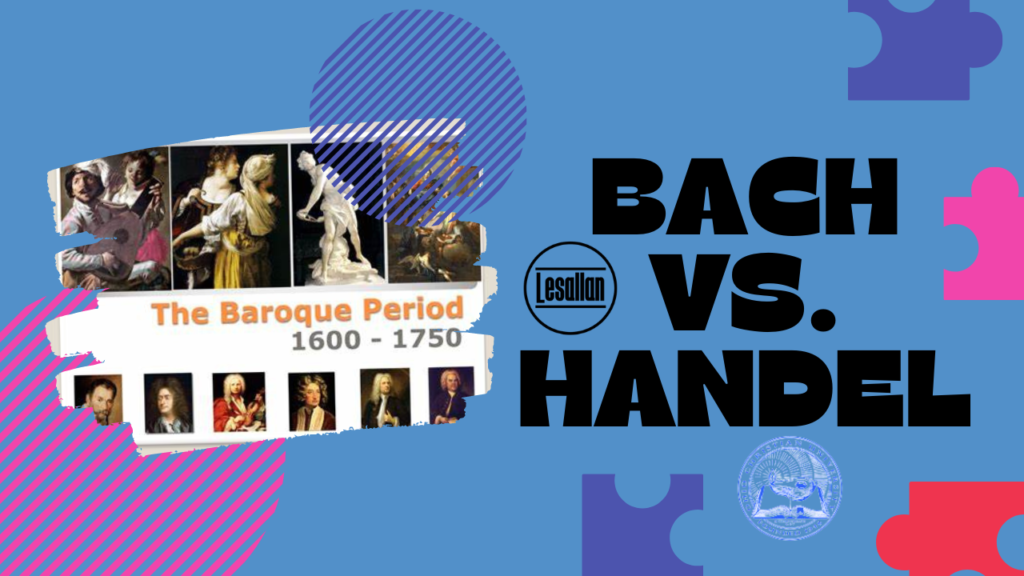
Bach vs. Handel – Fine Arts Appreciation
Written By Lesallan Bostron
FNA1000 Fine Arts Appreciation (ONAA58)
Ohio Christian University
Dr. Brent Nolte
May 24, 2023

Bach vs. Handel – Fine Arts Appreciation
Baroque music is a Western classical music style composed from 1600 to 1750. Baroque music boasts several vital genres, including Opera, Cantata, Fugue, Oratorio, and Suite. Opera is a grand theatrical piece that blends vocal and instrumental music with a libretto, often featuring costumes, scenery, and acting. Cantata is a vocal composition accompanied by instruments, typically consisting of various movements based on a religious or secular text. A fugue is a type of musical composition that uses counterpoint. It is when one voice plays a short melody or phrase, called the subject, and then other voices build upon and elaborate on it. Oratorio is a monumental musical composition for orchestra and voices, often featuring a religious narrative without action, scenery, or costumes. Finally, a suite is a well-structured collection of orchestral or instrumental pieces typically performed in a concert setting instead of being used as background music. Baroque composers such as Bach and Handel often used these genres to create grandiose, dramatic, and energetic works.
A Baroque composer refers to a musician who created music during the Baroque era, a cultural and artistic movement from the late sixteenth century to the early eighteenth century. Expressly, in the music industry, the Baroque period is acknowledged to have occurred from around 1600 to 1750 AD. A Baroque composer refers to a musician who created music during the Baroque era, a cultural and artistic movement that lasted from the late 16th century to the early 18th century. The music industry recognizes the Baroque period as happening between 1600 and 1750 AD. New musical forms and genres emerged during this time, including opera, cantata, fugue, oratorio, and suite. Baroque music is known for its grand and dramatic style, with plenty of energy and ornamental and polyphonic textures. Following the Baroque period, the Classical period was born, and several notable composers emerged. During the Classical period, several renowned composers emerged, including Wolfgang Amadeus Mozart, Ludwig van Beethoven, Franz Schubert, and Joseph Haydn. George Frideric Handel (1685-1759) and Johann Sebastian Bach (1685-1750) are two of the most highly acclaimed Baroque composers.
George Frideric Handel was a renowned Baroque composer who excelled in operas, oratorios, anthems, concerti grossi, and organ concertos. Handel hailed from Halle and was born in 1685, the same year as Bach. Although he was a private individual who never married and enjoyed climbing the social ladder, he also enjoyed traveling and working as a composer in Hamburg, Germany, and Italy. He eventually settled in London, England, in 1712, where he spent most of his career, and became a naturalized British citizen in 1727 (George Frideric Handel, 2023). Handel was a prominent figure in high baroque music. He revolutionized English church music, opera, and oratorio with masterpieces like Messiah, Water Music, and Music for the Royal Fireworks.
Johann Sebastian Bach (1685-1750) was a highly esteemed German composer and musician of the late Baroque era; he was known for his strong commitment to his artistic pursuits and family. Bach was born in the town of Eisenach, in the Thuringia region of the Ernestine Saxon Duchies in Germany, in 1685. After a long and accomplished career, he passed away in the bustling city of Leipzig in 1750, which is currently the most populous city in the German state of Saxony. Bach’s musical repertoire is renowned for its diversity, encompassing orchestral masterpieces to vocal music, including the Brandenburg Concertos, Cello Suites, Goldberg Variations, and St Matthew Passion. His exceptional skills as a composer have earned him high regard in Western music history, especially after the Bach revival in the nineteenth century.
Johann Sebastian Bach and George Frideric Handel were renowned Baroque composers who significantly impacted the music industry. Although they were born in Germany in the same year, their musical careers and compositions varied significantly.
Despite losing his parents at the age of ten, Bach continued under the guidance of his mentor, his very own brother, J C Bach. Bach’s exceptional skills on the organ and Klavier (stringed instruments) were unparalleled, yet he remained unknown during his lifetime. However, he served as Kapellmeister (master of the chapel choir) at Anhalt-Cöthen and produced timeless classics such as The Brandenburg Concertos.
Handel’s upbringing was very similar to Bach’s, as both men grew up in a middle-class Protestant family. However, Handel was an opportunist and social climber, traveling extensively to make himself known to aristocratic patrons who could support his ambitious ventures. Handel’s journey in music began as a violinist in the Hamburg orchestra. He had the opportunity to play various contemporary operas during his time there, which sparked his lifelong interest in the genre.
Bach is renowned for his exceptional polyphonic abilities and has created significant sacred music, including St. Matthew Passion, Mass in B Minor, and his last unfinished work, The Art of Fugue (Die Kunst die Fuge). Meanwhile, Handel composed operas, oratorios, suites, and sonatas to entertain the London public and the royal court.
Deciding on the superior composer between Bach and Handel is a challenging task. Both men were immensely gifted and left a lasting impact on music. Nevertheless, their styles and compositions were distinct from one another. For example, Bach’s intricate counterpoint and harmonic structure are widely recognized, whereas Handel gained fame for his operas, oratorios, and concerti grossi. Therefore, the answer to which type of music is preferred is subjective and depends on individual taste.
Both Bach and Handel were significant to the development of music history. Bach’s exceptional expertise in counterpoint, the harmonic and motivic organization and his incorporation of rhythms, forms, and textures from other countries, notably Italy and France, elevated the prevailing German styles. The music composed by Handel is considered a pinnacle of the “high baroque” style. His work elevated Italian opera to new heights, and he is credited with creating the genres of English oratorio and organ concerto. Additionally, Handel introduced a fresh style to English church music. The impact of these composers’ legacies on Western classical music is profound and enduring. Their compositions continue to be highly regarded and extensively analyzed in the present day.
References:
Connor, C., & Steinitz, M. (2013, November 22). Handel or Bach? The great Baroque debate. Bachtrack.com. https://bachtrack.com/nov-2013-baroque-bach-handel
Dr. Justin Wildridge. (2018, June 30). Bach vs Handel: The Two Extremely Famous Baroque Composers – CMUSE. Cmuse.org. https://www.cmuse.org/bach-vs-handel/
George Frideric Handel. (2023, May 22). Wikipedia. https://en.wikipedia.org/wiki?cv=1&curid=12775


